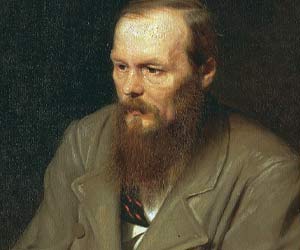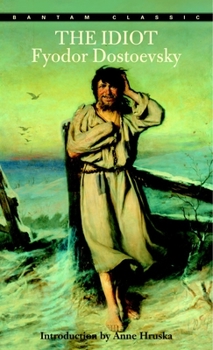The Idiot
Select Format
Select Condition 
Book Overview
Fyodor Dostoevsky's classic tale of one man's pure innocence in the face of a society obsessed with power, money, and manipulation The twenty-six-year-old Prince Myshkin, following a stay of several... This description may be from another edition of this product.
Format:Mass Market Paperback
Language:English
ISBN:0553213520
ISBN13:9780553213522
Release Date:July 1983
Publisher:Bantam Classics
Length:720 Pages
Weight:0.70 lbs.
Dimensions:1.2" x 4.2" x 7.0"
Customer Reviews
8 ratings
Got a fake version...
Published by Kate , 4 months ago
I ordered a Richard Pavear version instead got a poor job of faking a book, theres nothing in the book but untabbed, copied text from probably an online PDF, no introduction, nothing whatsoever. Terrible, and I paid nearly the original price for it.
Sent Wrong Translation
Published by Erindyan , 1 year ago
I specifically ordered the Constance Garnett translation and received a translation by Henry and Olga Carlise.
Great Read!
Published by Thriftbooks.com User , 1 year ago
This was a wonderful read. A little advanced and I did go to the front to remind myself which character was being referenced until I could remember them all. Funny how society as a general standard never changes no matter the place or the time.
A Great Novel
Published by Thriftbooks.com User , 16 years ago
Princy Myshkin is perceived by others around him as being an idiot, but I will leave it up to the reader to decide whether he really is one. Some characters perceive him to be the most trustworthy man they have ever meant, while others call him an intellectual and a democrat. Yet, most revert back to calling him an idiot. The book is full of the basest characters, and only Myshkin can offer them a shot at redemption. He sees them for their true selves, good or bad, and loves them for who they are. Myshkin has been called a Russian Christ and is one of the most provocative characters that I have come accross in literature. In addition to Dostoevsky's strong characterization, this book also includes the author's critique of capital punishment, the role of women in society, and the role of aristocracy. The book is both introspective and political, although not overly so. I found it to be a new favorite of mind, and I am sure it will stick with me for awhile. It is a very good novel.
Doestoevsky's Master Work
Published by Thriftbooks.com User , 17 years ago
What could have prompted me to first read "The Idiot" at age 13 on a beach vacation with my family I can not recall. What I do recall, however, that I was fully engrossed day after day in a world of ideas, people and places far beyond my experience. Having now just "re-read" it 39 years later (following Crime and Punishment and Brothers Karamazov), I know I couldn't possibly have digested all of its ideas at that age: atheism vs. Christianity; nihilism vs. a dying social order; Eros vs. charity; truth vs. artifice; id vs.ego and superego. And yet, I also sense I know what captivated me even then. The characters in this novel, though usually explained as symbolic of the ideas they represent, are yet the most vividly realized characters I had ever "read" then, and still. The real-time manner in which they are drawn and followed is as if the author simply recorded their actions and conversations as and where they happened. We get to know who these people are, not through narrative description, but, as if by "candid camera", observing what they say, withhold, do, and fail to do. What emerges are fascinating, at times frightening and at times affectionate portraits of real and troubled humans: Lizaveta, the flighty, but loving society mother; General Epanchin, the successful but utterly conventional man of the house; Aglaya, the childish but delightful beauty who resents her sister's and parents' expectation for her; Ganya, who wants money and love, but plays the wounded martyr while more obviously blaming his father for his failures at both; Ivolgin, the pathetic figure of an aging man who aches for dignity and respect but who's former glory is long gone and mostly imagined; and Lebedev, the likeable sycophant and name-dropper. The more central characters to the events, the murderously passionate Rogozhin, and the self-scorning beauty Nastasya, are more starkly drawn. But even those portraits are created not through direct thought narration or narrative description, but by the author's leading us to read between and behind the lines of their words, conversations with others, and public "displays". As for the Prince himself, he is often said to symbolize the human side of a Christ-like man. That, of course, is true; but (as can also be seen in Aloysha, the hero of The Brothers Karamazov), he is as much child-like as he is like a Christ. The Prince's honesty, naiveté, trust, and simple affection for those around him, are all qualities that he seems to maintain as a man because he is really only entering the "adult" world of social Petersburg after a long and sheltered upbringing among younger children in Switzerland. When he enters this tangled world of adult competition, insecurity, envy, ambition and intrigue, though much older, he's in the most essential ways still the child that was sent by his benefactor to Switzerland for help with his illness. One comes away with the strong impression (reinforced by the por
Dostoevsky's The Idiot.
Published by Thriftbooks.com User , 18 years ago
This is a classic Russian novel. Great book, but it took me like forever to read. I had a bit of difficulty keeping track of which characters were which, due to the Russian names and the fact that most of the characters are also known by a nickname. I'm sure that Russian people know that "Ganya" is a nickname for "Gavril", just like Americans know that "Dick" is a nickname for "Richard". But I'm not Russian. Anyway, it's a classic book and it's worth the effort to read it.
Profound, Timeless Relevance
Published by Thriftbooks.com User , 22 years ago
The Idiot is often unfairly compared to Dostoyevsky's other masterpieces and, even though The Idiot usually comes out on the short end of any comparison, it is certainly my favorite. Although the narrative of The Idiot may ramble more than do some of Dostoyevsky's other books, I feel it is ultimately more profound.At its core, The Idiot is a character/society study although it also encompasses many religious and political aspects as well. The central character, Prince Myshkin, provides the contrast for all the other characters and is definitely a "Christ-like" figure, a man who embodies most perfectly the Christian ideals of selflessness and love.Prince Myshkin is a man who has suffered from mental illness since childhood. This illness has the curious effect of causing him to respond from his heart rather than from his head. In addition, Myshkin also suffers from a form of epilepsy that causes him to launch into tirades regarding the social ills of the day. As a Christ-like figure, Myshkin is in direct contrast to the other characters in the book who are all worldly and sophisticated, though somewhat cynical, aristocrats. Myshkin's extreme goodness also causes him to become entangled in various political and personal intrigues.Although completely good, Prince Myshkin in a fully realized character. One of the marvels of this novel is that Dostoyevsky managed to present Myshkin as a serious, rather than a comic, character. His goodness is not something we want to laugh at. There are many comic moments in the book, however, and most of them are provided through various financial and romantic entanglements.Although Prince Myshkin is the thread that links all the characters and aspects in the novel, he is not the only fully realized character; the others are also extremely well drawn. Dostoyevsky was fond of using real life incidents in his books and his notes tells us this is something he did in creating the characters that populate this book.Ultimately, The Idiot is a tragic book. Politically, it ridicules the shallow ideals of the Russian aristocracy, and, while Prince Myshkin's ramblings may seem comic, they are actually harsh criticism.Prince Myshkin was more than "a positively good man." He was a man who could see into the future and know what lay in store. Dostoyevsky's deep insight into the character of man makes The Idiot one of literature's most profound and timeless works.
Overwhelmingly depressing yet phenomenal
Published by Thriftbooks.com User , 25 years ago
Not my favorite of Dostoevsky's but that may be because it even more than others ends differently than I desired. Once again I was amazed by his use of seemingly psychotic characters that in fact strike me as being incredibly accurate depictions of common persons. This author and this book move me more than any other. Everyone should have a copy.
The Idiot Mentions in Our Blog

A Life in Books: 9 of Fyodor Dostoevsky's Defining Works
Published by Ashly Moore Sheldon • January 15, 2021
Fyodor Dostoyevsky's successful first book, Poor Folk, came out 175 years ago today when the author was only 24 years old. But in a life beset by drama worthy of, say, a Russian novel, it would be many years before he produced a notable follow-up. Here we explore the literary giant’s best books and how they mirror his extraordinary life.







